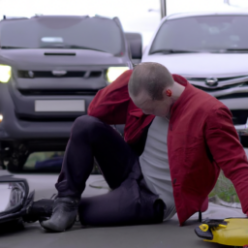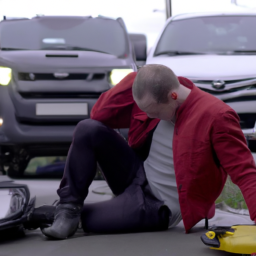Last Updated on April 14, 2023 by accidents
Car Accident Victims in PIP States. Discover the essential guide to PIP benefits, claims, and recovery for car accident victims in PIP states. Learn the steps to file a claim, manage denials, and recover physically and emotionally.
The Ultimate Guide to PIP Benefits and Recovery for Car Accident Victims in PIP States
Introduction
Car accidents can be a traumatic and overwhelming experience, and navigating the insurance claims process in Personal Injury Protection (PIP) states can be confusing. This comprehensive guide will help you understand the PIP benefits available to you, the steps involved in filing a PIP claim, and how to recover from a car accident both physically and emotionally.
What PIP is and what states require it ?
Personal Injury Protection (PIP) is a type of car insurance coverage that helps pay for medical expenses, lost wages, and other related costs for you and your passengers, regardless of who is at fault in a car accident. This coverage is also known as “no-fault” insurance, as it provides benefits without considering fault in the accident.
PIP coverage is required in several states, while others have it as an optional coverage. As of September 2021, the following 12 states and territories require PIP coverage: Florida, Hawaii, Kansas, Kentucky, Massachusetts, Michigan, Minnesota, New Jersey, New York, North Dakota, Pennsylvania, and Utah. Additionally, the District of Columbia and Puerto Rico also require PIP insurance.
Laws and regulations regarding PIP coverage vary by state, so it’s important to be familiar with your state’s specific requirements. Some states may have minimum coverage limits, while others allow you to choose your level of protection. It’s crucial to understand your state’s laws to ensure you have the appropriate coverage to protect yourself and your passengers in the event of an accident.
Benefits of PIP coverage
PIP coverage offers several benefits to policyholders and their passengers in the event of a car accident. Here are some key advantages of having PIP coverage:
- No-fault benefits: PIP insurance provides coverage regardless of who is at fault in an accident. This means that you and your passengers can receive compensation for medical expenses, lost wages, and other related costs without having to prove the other party’s fault, which can simplify and speed up the claims process.
- Medical expenses: PIP coverage helps pay for medical bills resulting from a car accident. This includes expenses such as doctor visits, hospital stays, surgeries, medications, and physical therapy. In some cases, PIP coverage may also extend to dental treatment and psychological therapy.
- Lost wages: If you or your passengers are unable to work due to injuries sustained in an accident, PIP coverage can help compensate for lost income. The specific amount and duration of lost wage benefits vary depending on your policy limits and state regulations.
- Rehabilitation and essential services: PIP insurance can also cover the cost of rehabilitation services, such as occupational therapy or physical therapy, that may be necessary to regain independence and return to daily activities. Additionally, PIP may cover essential services like childcare, house cleaning, or yard maintenance if you are unable to perform these tasks due to your injuries.
- Funeral expenses: In the unfortunate event of a fatality resulting from a car accident, PIP coverage can help pay for funeral and burial expenses, easing the financial burden on the deceased’s family.
- Survivor’s loss benefits: If a person dies as a result of a car accident, PIP coverage can provide financial assistance to the deceased’s dependents to help cover living expenses and maintain their quality of life.
By offering these benefits, PIP coverage ensures that policyholders and their passengers receive prompt and adequate financial support following a car accident, regardless of who is at fault.
How to File a PIP Claim
Filing a PIP claim can be an essential step in recovering from a car accident. We’ll break down the steps involved and provide tips for filing a successful claim.
- Steps involved in filing a PIP claim
- Notify your insurance company immediately after the accident
- Collect necessary documentation, such as police reports and medical records
- Complete the required forms and submit them to your insurer
- Tips for filing a successful claim
- Take detailed notes of the accident and your injuries
- Keep all receipts related to medical expenses and property damage
- Maintain open communication with your insurance company
What to Expect After Filing a PIP Claim
Once you’ve filed your PIP claim, it’s essential to understand the timeline and what to expect if your claim is denied.
The timeline for processing a PIP claim can vary depending on the state and the specific circumstances of the car accident. However, there are some general guidelines and deadlines to keep in mind:
- Reporting the accident: Most insurance companies require policyholders to report an accident as soon as possible, typically within a few days. Reporting the accident promptly ensures that your claim process starts without delay.
- Submitting the PIP claim: Each state has its deadline for submitting a PIP claim, which can range from 30 days to several months after the accident. It’s essential to be aware of your state’s deadline and submit your claim within the specified time frame to avoid losing your right to PIP benefits.
- Insurance company response: Once you submit your PIP claim, the insurance company typically has 30 days to investigate the claim and make a decision. The insurer will either accept or deny the claim, or request additional documentation or information.
- Payment of benefits: If your claim is accepted, the insurance company will begin paying your PIP benefits. Payments are usually made on an ongoing basis, covering medical expenses, lost wages, and other costs as they are incurred. The exact timing and frequency of payments may depend on the specifics of your policy and the nature of your expenses.
- Resolution of the claim: The PIP claim process concludes once all your expenses have been paid up to your policy limits or when you reach the maximum duration for benefits as specified by your state’s laws.
Throughout the PIP claim process, it’s essential to maintain open communication with your insurance company and provide any requested documentation or information promptly. This will help ensure a smoother and more efficient claims process. Keep in mind that the timeline for processing a PIP claim can vary depending on individual circumstances, and some claims may take longer to resolve than others.
- Timeline for processing a PIP claim
- Most states have specific deadlines for filing a PIP claim
- Insurance companies typically have 30 days to accept or deny your claim
- What to expect if your claim is denied
- You have the right to appeal the decision
- Seek legal advice if you’re unsure about the process or need assistance
How to Recover from a Car Accident
Recovering from a car accident involves more than just financial compensation. We’ll discuss tips for recovering physically and emotionally, and the importance of seeking medical attention and dealing with stress.
- Tips for recovering from a car accident physically and emotionally
- Get adequate rest
- Eat a balanced diet and stay hydrated
- Engage in light physical activity as recommended by your doctor
- Stay connected with friends and family for emotional support
- Importance of getting medical attention and following your doctor’s orders
- Prompt medical attention can identify hidden injuries and prevent complications
- Following your doctor’s orders can speed up the healing process and improve your chances of a full recovery
- How to deal with the stress and anxiety of a car accident
- Seek professional counseling if necessary
- Practice relaxation techniques, such as deep breathing exercises and meditation
- Focus on activities you enjoy to take your mind off the accident
Why you need a lawyer to handle your pip claim ?
Hiring a lawyer to handle your PIP claim can be beneficial for various reasons, especially if you’re facing a complicated or disputed claim. Here are some reasons why you might need a lawyer to handle your PIP claim:
- Expertise in insurance laws and regulations: Lawyers specializing in personal injury and insurance claims have extensive knowledge of state-specific insurance laws and regulations. They can help you understand your rights, the benefits you’re entitled to, and ensure your claim is in compliance with all legal requirements.
- Efficient claims handling: A lawyer can help manage the claim process on your behalf, ensuring that all necessary documentation and paperwork are submitted accurately and promptly. They can also assist in gathering evidence, such as medical records and witness statements, to support your claim.
- Negotiating with insurance companies: Insurance companies may try to offer a lower settlement or even deny your PIP claim. A lawyer can effectively negotiate with the insurer on your behalf, using their legal expertise and knowledge of your case to secure a fair and adequate settlement.
- Dispute resolution: If your PIP claim is denied or you disagree with the insurance company’s decision, a lawyer can help you appeal the denial or even represent you in court, if necessary. They can provide legal advice on the most suitable course of action and ensure that your rights are protected throughout the dispute resolution process.
- Maximizing compensation: A lawyer can help you receive the maximum PIP benefits you’re entitled to by thoroughly evaluating your case and identifying all possible sources of compensation. This includes ensuring you’re not missing out on any benefits due to a lack of knowledge or understanding of the claim process.
- Peace of mind: Hiring a lawyer to handle your PIP claim can provide you with peace of mind, knowing that a professional is handling your case and working to secure the best possible outcome. This allows you to focus on your recovery rather than the complexities of the claim process.
While hiring a lawyer for your PIP claim may not be necessary in every case, it can be particularly helpful if you’re dealing with a complex or disputed claim or if you’re unsure of your rights and the benefits you’re entitled to. A lawyer can provide valuable guidance and support, ensuring that you receive fair compensation and navigate the claim process with confidence.
Conclusion
In summary, understanding the PIP benefits available to car accident victims in PIP states is crucial. Knowing how to file a claim and what to expect during the process can ease some of the stress associated with the aftermath of an accident. Additionally, focusing on your physical and emotional recovery is vital for your overall well-being. Don’t hesitate to seek legal advice if you have any questions or concerns about your PIP claim.

